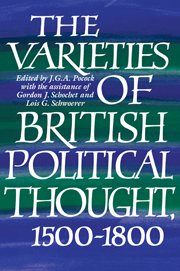Book contents
2 - Elizabethan political thought
Published online by Cambridge University Press: 04 August 2010
Summary
Ius: Law: right: authoritie: libertie: power. Thomas Cooper, Thesaurus linguae Romanae et Britannicae (1565)
The languages of political thought
Public discourse in the second half of the sixteenth century was carried on through an extraordinary confusion of tongues, and the history of political thought can be reconstructed only through a serious effort of discrimination, translation, and decipherment. The interpretation of political texts often requires highly problematical judgements. Is a particular work an illocutionary ‘act’ (whether a legal enactment or a 'speech act’ more generally)? A pedagogical treatise or an entertainment? A serious statement or a satire, a parody, or even a hoax? A piece of conventional rhetoric or a real cry of pain? A conscious expression or a discourse in which the author is overwhelmed by the inertial force of literary tradition? A personal statement or a ‘contribution’ to a canon? A ‘classic’ or just a historical document? Does it address ‘our’ questions or merely reflect bygone contexts and predicaments? Or is it a mixture of all of the above?
Context is hardly less problematical than text, involving as it does questions of time as well as space. Political texts, in other words, may be considered in a long intellectual continuum going back to Aristotle or Cicero or in what Conal Condren calls a ‘political theory community’ extending down to our own day, but it may also be placed in a particular cultural environment remote from our experience; and here it is essential to be aware of the values, assumptions, linguistic and conceptual resources, and social and political predicaments of the actors and speakers of a bygone age.
- Type
- Chapter
- Information
- The Varieties of British Political Thought, 1500–1800 , pp. 47 - 79Publisher: Cambridge University PressPrint publication year: 1994

